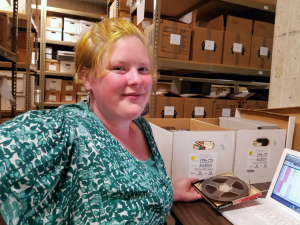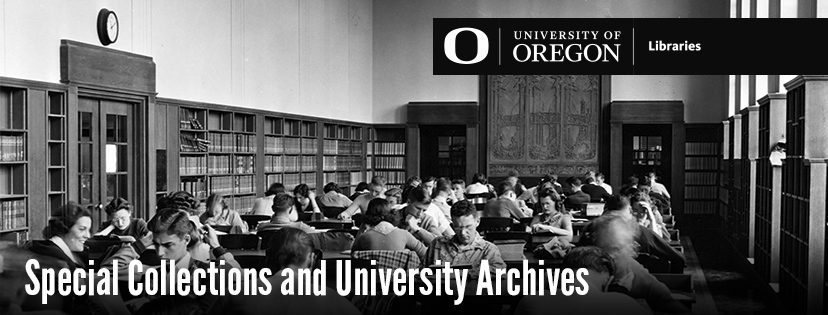A Step Back in Time: Processing the University Archives Sound Recordings

Walking through the ironwork doors of the Knight Library to begin my internship at the Special Collections and University Archives department was like walking through a portal into the past. Part of this feeling was personal, I attended UO as an undergrad ten years ago, graduating with a BA in International Studies in 2008. While an undergrad I worked in the UO Libraries’ Access Services department and often spent several hours a day in Knight Library engaged in either work or study. While I stayed in Eugene after graduation, I had not been back to Knight Library more than a handful of times since tossing my cap in the air and hanging my diploma on the wall. However, my personal sense of nostalgia at being back on campus quickly deepened into a fuller appreciation of being a part the long, rich history of academic life on campus as I began working with the University Archives Sound Recordings Collection.
This collection is primarily made up of reel to reel tape recordings, with only a few copies of the original recordings having been made on cassette tapes or CDs over the years, so the format itself gives you a feeling of being connected to a bygone era. The content of the recordings – mostly college events, guest lecture series, and political speeches – proved to be a fascinating portrait of the times. The titles of the lectures reveal a public discourse preoccupied by communism, Asian art and religion, education theory, and US foreign policy. In working on researching the correct form of speakers’ names I found the collection contained recordings featuring easily recognizable political figures like John F. Kennedy and literary giants like Robert Frost mixed with the now lesser known names of notable academics, authors, political theorists, and activists. Beyond the thesis of their speeches, these voices from the past have so much to tell us about the history, culture, and public life of America during the time period they were made. They also tell us about the central position of universities within the nation’s political discourse during a time period when college campuses were a regular stop on the lecture circuit for politicians as well as academics. For example the collection contains almost thirty recordings featuring Wayne Morse, United States Senator from 1945-1969, in addition to many single events featuring local and national political figures. Something we don’t see happen today, even in general election years.
The collection also includes a large set of campus life and college history events like graduations, ground breaking ceremonies, and football games. These recordings give alumni the chance to look back on their big day(s) at UO and current students the chance to learn about and feel connected to their school’s history. One of the things that working with this collection made me think differently about was how many amazing lectures, presentations, and speeches I missed out on when I was a student here because at the time I thought I was too busy with other things to attend them. I highly encourage current students to not only check out this impressive collection of historical recordings but to also pay attention to the bulletin boards and social media posts announcing events around campus. Who knows, you may one day be able to say I got to see America’s next Poet Laureate or economics superstar speak in person while I was in college. Now how cool is that?
The finding aid for the University Archives Sound Recordings Collection (UA 180) will be made available shortly on Archives West.
Kristin Gustafson is currently working on her Masters in Library and Information Science with a focus on Archives Management through an online program offered at Simmons College in Boston. Her internship with Special Collections and University Archives this semester has been an integral part of her Introduction to Archival Methods and Services coursework as well as an exciting opportunity to do on the job training at a large university archives.

